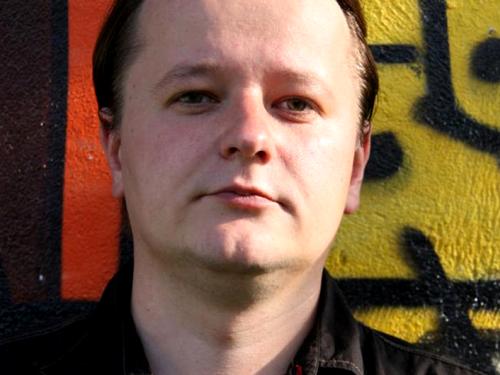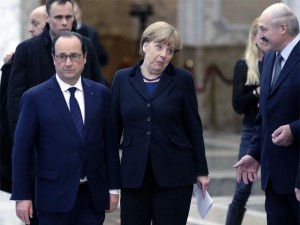Poland and Germany were both initiators and drivers of a New Eastern policy linked to the Eastern neighborhood and Russia/Soviet Union.
Andrei Yahorau: The EU won’t go back on its demands towards Belarusan authorities

Without the release of political prisoners and shifts in providing freedoms of the election process, there is no reason to expect considerable changes in relations between Minsk and the EU.
Andrei Yahorau, the Head of the Centre for European Transformation, was elected a Co-chair of the Steering Committee of the Eastern Partnership Civil Society Forum (EaP CSF). It happened at the meeting of the Steering Committee of the EaP CSF on February 5 in Brussels.
Can the relations between the official Minsk and EaP CSF change in the near future? What hopes do Belarusan authorities have in respect to the Eastern Partnership Summit in Riga and are these hopes feasible? What is the further fate of the Eastern Partnership program?
Andrei Yahorau, Co-Chair of the Steering Committee of the EaP CSF, answers the questions of EuroBelarus Information Service.
— A week ago you were elected a Co-Chair of the Steering Committee of the Eastern Partnership Civil Society Forum. Considering dislike of the Belarusan state to the third sector and desire to force it out of the Minsk-Brussels dialog, how will the authorities perceive your appointment?
— The authorities didn’t react and will hardly react to the reelection of the Belarus’ representative to the Steering Committee of the Eastern Partnership Civil Society Forum. This is not the first case, when Belarusans head the Steering Committee of the EaP CSF: before me Siarhei Mackevich, Ulad Vialichka, headed this committee. The authorities didn’t express any attitude towards the election of Belarusans to the Steering Committee. And that’s a pity, because the Civil Society Forum is a significant institution of the Eastern Partnership that would like to have full-fledged relations with the authorities.
— Should we expect fateful decisions for the Eastern Partnership from the Summit in Riga?
— No, there are no particular fateful decisions that we are to expect from the Summit in Riga. The Summit will be organized for work, and decisions re the format of the further work of the Eastern Partnership will hardly be made.
The EU rather perceives the situation by default. The EU will adjust its policy in accordance with the specific interests of different countries; will build its politics in accordance with the interests of the countries in the spheres they are ready to collaborate.
It should be noted that starting from March the EU would launch a process of reviewing its neighborhood policy. The process is to end before autumn. Perhaps, during the evaluation of cooperation we will notice big changes, but I wouldn’t expect drastic change.
— What significance has participation in Riga Summit for the official Minsk? If we judge according to the statements done by the officials, participation in the Forum has no specific significance for Belarus: Lukashenko himself states that he doesn’t aspire to go to the Summit, while Makei demands equality for the Belarusan delegation.
— Despite the official position of Minsk, the Summit has quite important meaning for the Belarusan authorities. First, participation in Riga Summit will confirm Belarus’ inclusiveness in the process of cooperation with the EU. Secondly, at the Summit in Riga an agreement about visa simplification regime for Belarus might be signed. An initiative of Belarusan Foreign Ministry re harmonization of digital markets might also be signed; and that initiative might become one of the flagman’s initiatives within the frames of the second platform (second platform is an interstate platform for economic cooperation within the frames of which the countries-members of the Eastern Partnership, the EU and relevant agencies are cooperating. — EuroBelarus Information Service).
— The Belarusan Foreign Minister Makei has already demanded that “no discrimination is used against Belarus”. What is hidden behind the rhetoric of the Minister?
— Nothing is hidden behind these statements — Minsk is trying to save face. Belarusan authorities are maintaining consistent stance re their demands. But Minsk understands that contradictions between Belarus and the EU remain: without the release of the political prisoners and shifts in providing freedoms of the election process no serious improvement of Belarus-EU relations is to be expected.
The official Minsk stresses the inflexibility of its stance; however, the EU won’t give up its principal demands towards Belarusan authorities either. The EU’s demand is built on equality towards all countries-members of the Eastern Partnership. Belarus signed the declaration of the Eastern Partnership about the observation of human rights, which it doesn’t want to observe now.
— In one of the recent interviews you noted that the Summit in Riga will hardly revise the Eastern Partnership, and the EU takes it as a fact that the EaP is divided into two blocks of countries: those that aim at integration with the EU and those that don’t. Are there chances that in the current geopolitical situation Belarus will change its orientation and try to move to the first group? At least for weakening the Russian attraction?
— Of course, Belarus can’t make any sharp moves now, as all of them are fraught with serious consequences. At the same time, Belarusan authorities recognise the threats coming from Russia. Belarusan authorities are concerned with the search of guarantors of their security; that is why the official Minsk seeks closer cooperation with the EU, though making it with high caution. The process is complicated by the existing problems in bilateral relations: the presence of political prisoners in Belarus and absence of progress in the election process. Without resolving these basic problems bilateral relations will not change considerably.
— What aims do you set before you as a co-chair of the Eastern Partnership?
— The main goal is to realize the provisions of the latest Eastern Partnership Civil Society Forum. The main tasks are to strengthen the institutionalization of the civil society role in monitoring and implementation of the association agreement and common interaction between the countries-members and the EU. The second task is institutionalization of the National Platforms’ role in cooperation with the countries-members of the Eastern Partnership and the EU. In other words, to provide National Platforms with the possibility to interact with the delegations of the EU, Parliaments, and governments of the countries-members of the Eastern Partnership as equals, not as wingside spectators.
Rights and opportunities of the National Platforms should be extended so that they promote the process of Europeanization of their countries.
Others
-
Uladzimir Matskevich: The sooner the "Union State" is denounced, the better for Belarus
Not only does the “Union State” undermine the establishment of civilized relations with Europe, but it hinders the possibility of normal relations between Belarus and Russia.
-
Uladzimir Matskevich: The regime can no longer control the situation in the country
The authorities are unable to prolong the social contract with the people: there is no way out of the social crisis.
-
Press release of the BNP in connection with the next round of the dialogue in the format of the EU-Belarus Coordination Group
Belarusan National Platform of the Eastern Partnership Civil Society Forum welcomes the dialogue process in the format of the EU-Belarus Coordination Group, the third round of which was held in Minsk on 3-4 April 2017.
-
Hennadiy Maksak: Europe must react adequately to the events in Minsk
A new wave of political repressions should make the EU return to tougher policy towards the Belarusan regime.








Comments
From farewell to a new Eastern policy and towards a new development
Poland and Germany were both initiators and drivers of a New Eastern policy linked to the Eastern neighborhood and Russia/Soviet Union.